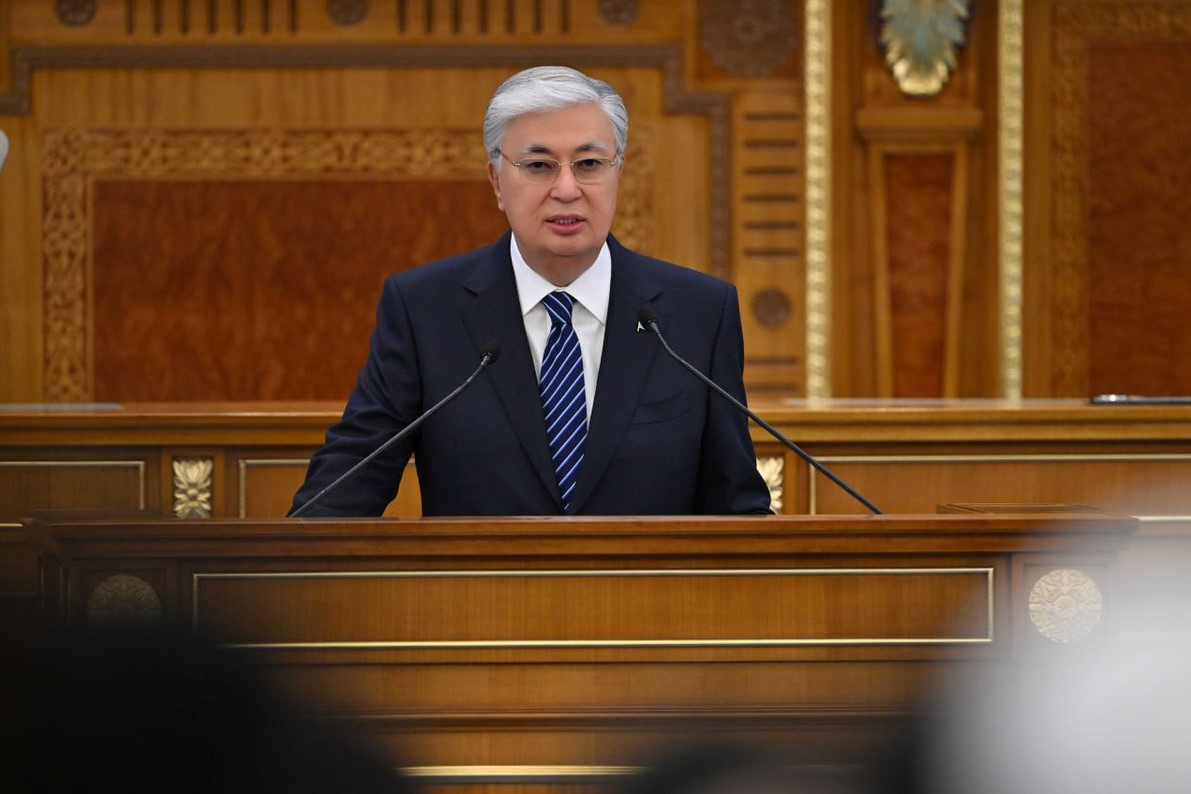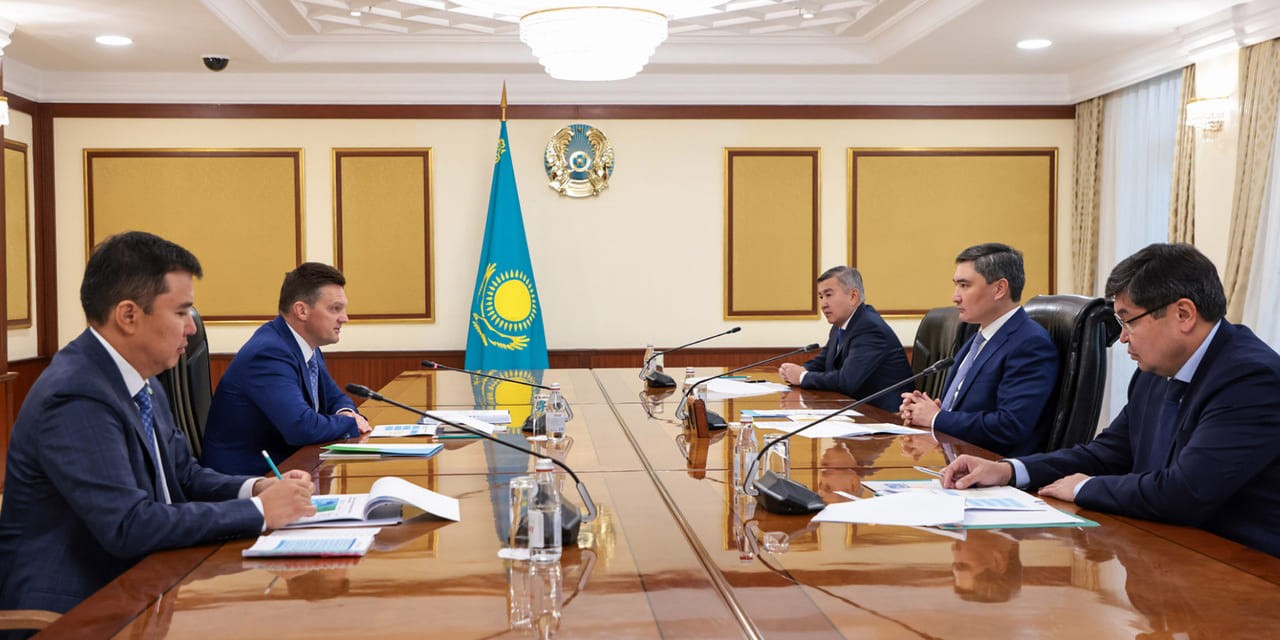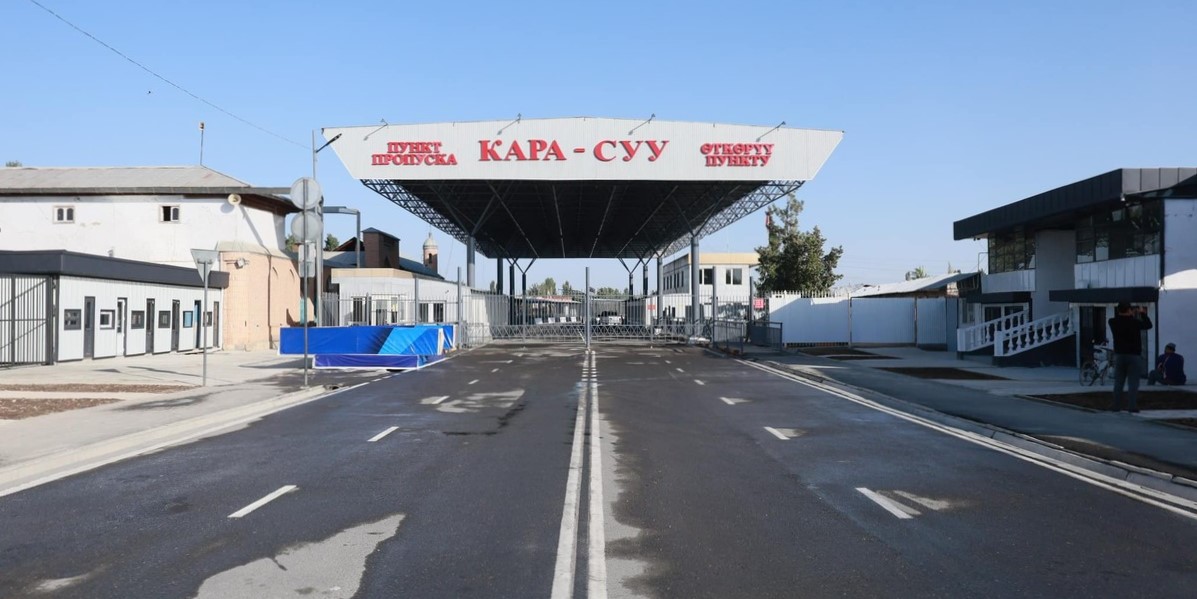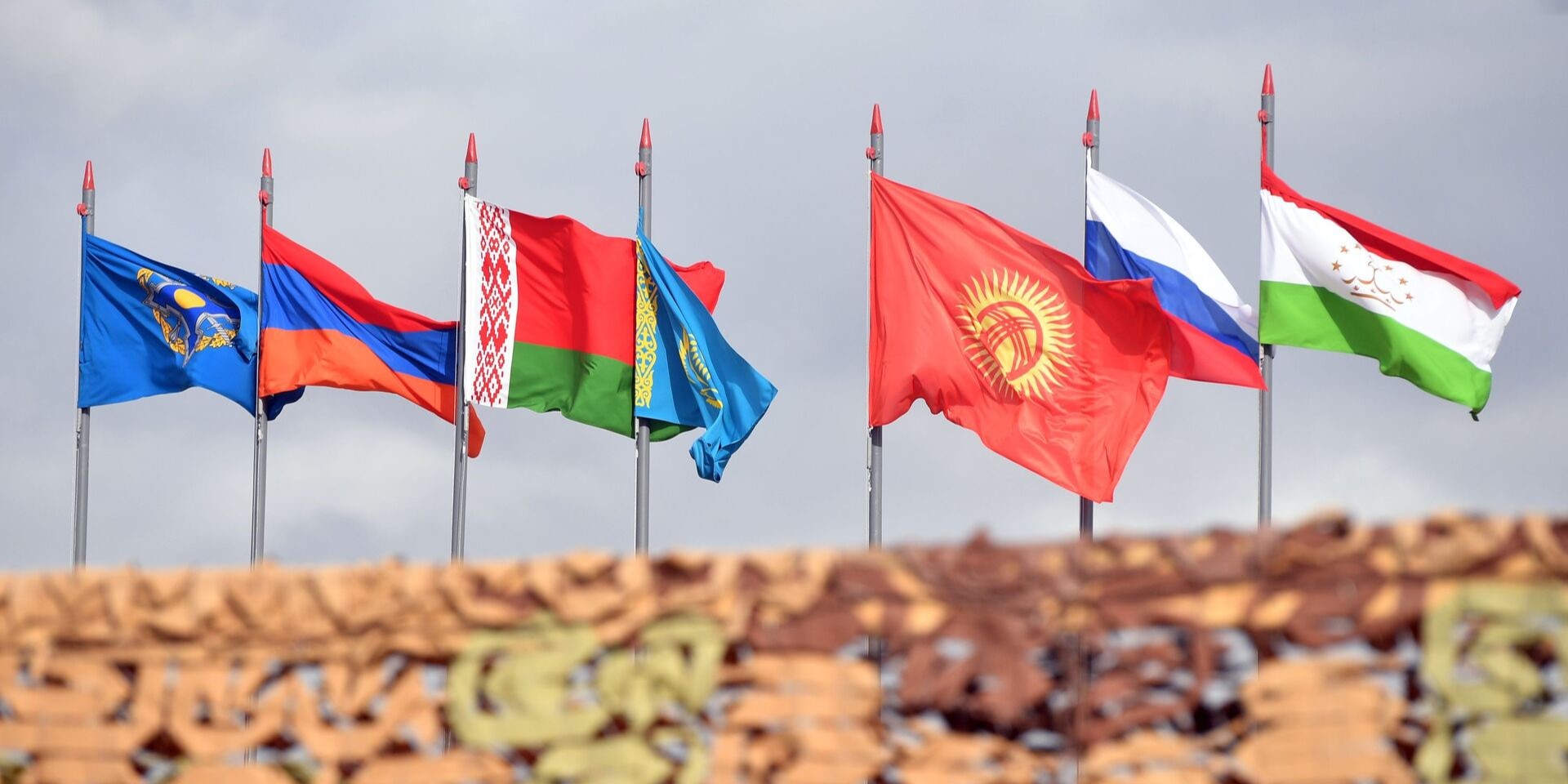Over the past week, the media in the region have been focusing on Kyrgyzstan’s removal of the Taliban from the country’s list of extremist organizations. They have also discussed several military and anti-terror drills conducted by the SCO, CIS, and the CSTO in Kyrgyzstan and Uzbekistan. Many sources also highlighted Kazakhstani President Kassym-Jomart Tokayev inking a presidential decree on a referendum on constructing a nuclear power plant. Others have been concentrating on several new investments and bilateral agreements in the region, such as those between Kazakhstan and the Arab Coordination Group, as well as Turkmenistan and Afghanistan.

Kazakhstani President Kassym-Jomart Tokayev delivers state-of-the-nation address. Source: Astana Times
Diplomatic Relations
Kyrgyzstan has officially removed the Taliban from its list of terrorist and extremist organizations whose activities are banned in the country (AKIpress). The Prime Minister of Kyrgyzstan, Akylbek Japarov, also noted at a meeting with the Afghan Chargé d’Affaires Nurullah Amin, that Kyrgyzstan was interested in developing economic relations with Afghanistan (24.kg). However, the website of the State Committee of Religious Affairs of the Kyrgyz Republic still lists the Taliban as a prohibited organization (State Committee on Religious Affairs). Since the Taliban assumed power in Afghanistan in 2022, countries in the region have sought to develop ties with the new regime in Kabul to ensure stability in Central Asia. Earlier this year, Kazakhstan also removed the Taliban from its list of extremist organizations, and as recently as last week, recognized a Taliban diplomat, Mohammad Rahman Rahmani, as the Chargé d'Affaires of the Afghanistan Embassy in Astana. Uzbekistan and Turkmenistan have also concluded several agreements with the Taliban to boost regional trade and connectivity. This also comes amid reports that Russia is also considering recognizing the Taliban regime (Daryo).
Energy
During his annual state-of-the-nation address, Kazakhstani President Kassym-Jomart Tokayev announced that a referendum on constructing a nuclear power plant will be held on October 6 (Kazinform). He stated that every major decision concerning the county’s future must enjoy public support. He also elaborated that his decision was part of his “listening state” concept and laid the groundwork for a new approach to making state decisions (The Astana Times). This follows reporting last week on the importance of the NPP for Kazakhstan. The country continues to suffer from electricity shortages and struggles to import sufficient electricity from its neighbors.
In other news, the Kazakhstani government has denied reports that maintenance works at the Kashagan oil field had been delayed (Kursiv). Reuters reported that the Energy Ministry had asked the operators of the field to postpone maintenance due to a shortage of liquefied natural gas in the country (Reuters). However, according to the Energy Ministry, it was only one of several options discussed with shareholders. Kazakhstan also reaffirmed its commitment to the OPEC+ agreement and noted that the planned repair works would compensate for the significant overproduction earlier this year.

Kazakhstan's Prime Minister and EDB's Chairman discuss expanding investment collaboration. Source: PM's Office
Trade and Investment
Kazakhstan is projected to receive between $1.4 and $1.6 billion from the Eurasian Development Bank (EDB) in 2024 (Daryo). At a recent meeting with Kazakhstani Prime Minister Olzhas Bektenov, the head of the EDB, Nikolai Podguzov, noted that the bank has invested over $900 million in multiple projects in Kazakhstan so far this year. Key projects include cyclic-flow coal mining technology, highway construction, solar power plants, and the Astrakhan–Mangyshlak water pipeline. The EDB is a multilateral development bank that fosters economic integration within the wider Central Asian region.
The Kara-Suu border crossing between Uzbekistan and Kyrgyzstan will soon reopen after being closed for over 14 years (Kun). The opening of the crossing is intended to relieve pressure on the crucial Dostuk-Dustlik crossing. Kyrgyzstan’s Ministry of Economy and Commerce announced this week that a new electronic queuing system would be employed at the border, with the Kyzyl-Kiya - Uzbekistan border crossing in the Batken region being selected for the pilot phase of the project. Overall, the new project, funded by the European Union, and the Ready4Trade Central Asia International Trade Centre, aims to reduce border crossing times and other trade barriers.

Kara-Suu border crossing reopens between Kyrgyzstan and Uzbekistan. Source: Kun.uz
Back in Kazakhstan, President Kassym-Jomart Tokayev chaired a meeting of the Astana International Financial Centre (AIFC) Management Council (Kazinform). He noted the center’s success in attracting investment thanks to its favorable tax and visa regimes. He recommended the center enhance cooperation with state institutions and regulatory bodies, and that the center needed to increase its liquidity by attracting institutional investors. To this end, he suggested allowing foreign investment management companies access to the pension assets of the AIFC (Kursiv). He also discussed strengthening the Kazakhstani stock market and strongly encouraged Kazakhstani companies to go public, thus increasing their efficacy and transparency.
Afghanistan’s Ministry of Mines and Petroleum has signed of several memorandums of understanding (MoUs) with Turkmenistan (Daryo). The MoUs cover several infrastructure projects, such as the Turkmenistan-Afghanistan-Pakistan-India (TAPI) gas pipeline, a power transmission line from Turkmenistan to Pakistan, and railways links between the two countries. Overall, these agreements and the development of ties between the two countries aim to ensure stability and economic growth throughout the wider region.
During a meeting with Kazakhstani President Kassym-Jomart Tokayev, representatives of the Arab Coordination Group (ACG) pledged $7 billion to infrastructure projects in Kazakhstan (Kazinform). The ACG consists of the Islamic Development Bank, the Saudi Fund for Development, the Organization of the Petroleum Exporting Countries (OPEC), the Fund for International Development, the Kuwait Fund for Arab Economic Development, and the Abu Dhabi Fund for Development. The Kazakhstani side presented several projects at the meeting, and a protocol and funding agreement was signed. The volume of investment will also likely increase in the future. Overall, President Tokayev also highlighted that these agreements contributed to Kazakhstan’s goal of attracting $150 billion in foreign direct investment by 2029. President Tokayev also met with the president of the Islamic Development Bank and the OPEC Fund for International Development. He noted that the Islamic Development Bank had worked with Kazakhstan to implement 70 projects worth $2 billion (The Astana Times).
Security
On September 4, several conferences and exercises were held by the Shanghai Cooperation Organisation’s Regional Anti-Terrorism Structure and the Anti-Terrorism Centre of the Commonwealth of Independent States (UZ Daily). Uzbekistan’s State Security Service Chairman Abdusalom Azizov called on states in the region to support Afghanistan in the fight against "ISIS-K," which continues to organize attacks in Afghanistan and the wider region (Kun). He stated: “Providing assistance to Afghanistan in combating 'Khorasan Province'[Sic] is crucial because weakening countermeasures could lead to the strengthening of this group, which in turn would threaten regional security.” During the “Vostok-Antiterror 2024” drills, forces from CIS and SCO states concluded exercises in preventing terrorist attacks, protecting critical infrastructure, and rescuing hostages. These security exercises and conferences follow earlier reports concerning a rift between the Taliban and Uzbekistan over the fate of an aircraft used by Afghanistani military personnel to flee the country following the Taliban seizure of power in 2021 (Daryo).

CSTO military drills begin in Kyrgyzstan. Source: Asia Plus.
The Collective Security Treaty Organisation (CSTO) military drills, "Interaction-2024", as well as special exercises "Search-2024" and "Echelon-2024," have begun in Kyrgyzstan (AKIpress). The opening ceremony was attended by the head of the CSTO, as well as defense ministers and military leaders from Belarus, Kazakhstan, Kyrgyzstan, and Russia. The exercises involve the organization’s Collective Rapid Response Forces, which include 1500 men and up to 300 other pieces of equipment. These exercises come as Armenia announced earlier this year that it will leave the CSTO over the Nagorno-Karabakh conflict (Kursiv).
Environment
An expedition by the German Ministry of Science and Higher Education and the Uzbekistani Ministry of Innovative Development as part of the German “Green Central Asia” program has discovered that the Pakhtakor glacier near Tashkent has shrunk by 20 meters over the past year alone (Kun). Glaciers in the Piskent mountains can be up to 4000 meters in length, with Pakhtakor being the largest. If this rapid melting continues, water supplies will be severely impacted in the future. Glacial lakes may also form, but flooding in mountainous areas may increase since they lack natural dams. Other research has shown that between 1979 and 2010, glaciers in the Naryn River basin melted by up to 30%. Concern over current and future water shortages is growing in the region. Earlier reporting suggests that glaciers account for nearly 60% of the region’s water (Daryo). Nevertheless, Central Asian states are taking the issue increasingly seriously. As reported earlier, in 2025, Tajikistan plans to host the International High-Level on Glacier Preservation.

